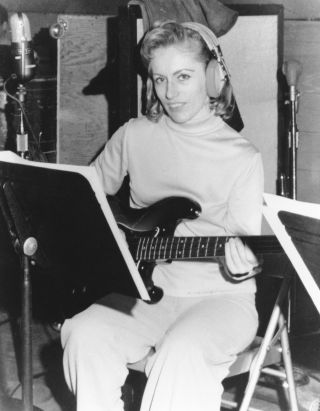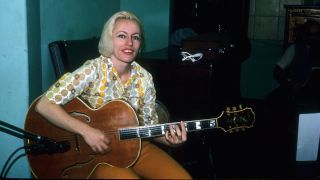Pick a seminal record at random, scan the credits, and there she is: “Bass: Carol Kaye”. Between her 1957 studio debut and her 70s burnout, Kaye became, quite simply, the most recorded bassist in history, her sprawling session resume taking in more than 10,000 tracks, most of them stone-cold classics.
“How many people,” she reminded one interviewer, “can go home and say: ‘I played with Frank Sinatra today,” or ‘We cut a cool track for the Beach Boys this afternoon.’ Not many, I imagine.”
Born into a hardscrabble Washington family in 1935, domestic violence was commonplace, and one of her earliest revelations was that “the only thing that stopped the fights was music”. By 1954, having persuaded her abused mother to leave her abusive father, Kaye was using her precocious guitar skills to keep them both afloat, earning money in the big bands and jazz clubs of LA. If you could play, she remembered, you survived:
“I was a white girl with blonde hair, but I was welcome in the black clubs.” Kaye might have stayed on that path were it not for a chance encounter. “[Producer] Bumps Blackwell came into a club and saw me playing bebop jazz,” she told MusicRadar. “He asked me to play on a record he was producing [Sam Cooke’s 1957 hit Summertime]. I didn’t want to do it, because I liked the clubs, but I needed the money. It wasn’t long till I realised there was more money in making records.”

Kaye concedes that on LA’s competitive session scene she was never more than a “fourth-call” guitarist, but in 1963, when a Capitol Records bassist failed to show, she pounced on his instrument. In shades and go-go boots, the twenty-something was a sore thumb among the suited sessioners of the era. But within months, Kaye was claiming most of the bass work in town, playing with a fluid touch that she described as “dancing on top of the beat”.
Her credits racked up as she earned the modern equivalent of $10,000 a week. She supplied the melodic throb on Glen Campbell’s Wichita Lineman (“A lot of people don’t know it, but I played the wrong notes”) and endured 30-odd takes of the Beach Boys’ Wouldn’t It Be Nice. And although legendary producer Phil Spector showcased her talents on 1966’s River Deep Mountain High, she found him “strange – half of the people in the studio loved him, the other half couldn’t stand him”.
It was a breakneck lifestyle, she recalled, fuelled by caffeine and camaraderie (“Sometimes we had to sleep on our five-minute break on the floor, run to the next date”), and a crash was inevitable. As the 60s turned, Kaye declared herself “burnt out”, bemoaning the production line approach to hit-making and spooked by the Manson family’s killings.
She threw herself into soundtrack work for a time – playing on music for In The Heat Of The Night, The Thomas Crown Affair, In Cold Blood, The Long Goodbye, Butch Cassidy And The Sundance Kid, and TV themes like M.A.S.H., Mission Impossible, Ironside, Hawaii 5-0, The Brady Bunch, Hogan's Heroes, The Addams Family - before withdrawing from the session scene just as the concept of the house band became old hat.
“Synthesisers came in about the mid-seventies,” she told Richie Unterberger, “and started to take jobs away.” In 2021, Carol was voted the 15th greatest bass player of all time in a MusicRadar poll and she remains a prolific force, running a production company, writing
her memoirs and mobilising thousands of musicians via her bass tutorial books and Skype lessons. But it’s the tunes that will be her lasting legacy. “You know how it is,” she mused recently. “You turn on the radio, you hear something and you go: ‘Oh yeah, I played on that.’”


